Photographs: Reuters
The Allahabad high court judgment in the Ayodhya title suit is emerging as the mother of all jugaad* anybody can think of.
The judgment, which gave the main litigants a piece of land, is being dubbed as a compromise to help the militant litigants to move forward, rather than help set a new benchmark in the interpretation of law in the settlement of religious-political-historical issues.
Although the judgment tries to convey that nobody is a loser, a large section of Muslims feel they have lost the case while believers in Lord Ram have been pleasantly surprised to receive a legal seal on their millenniums-old faith.
The most important thing to note is that in spite of its intriguing interpretation of evidence, the judgment has instantly got acceptability in mainstream India.
*Jugaad, an innovative formula chalked out by flexing laws
Both BJP, Congress have supported the verdict
Image: Another scene from AyodhyaPhotographs: Reuters
Both political parties have hailed the court verdict.
Leaders from their parties, privately, claim that Hindus all over India are upbeat about the acknowledgment of their belief that Lord Ram was born in Ayodhya.
In fact, not just the Congress party, even government representatives looked a bit relaxed the day after the judgment.
While treading carefully, Home Minister Palaniappan Chidambaram noted on Friday, 'The judgment is indeed an important document. But it is not operational. It is a fair assumption that appeals may be lodged (in the Supreme Court). It is a fair assumption that the Supreme Court will pass interim orders. Therefore, there is no need now to comment on the judgment which is not operational and the status quo as decreed in a Supreme Court order in 1994 will be maintained.'
The verdict has been accepted by mainstream India
Image: Security personnel on duty after the verdictPhotographs: Reuters
India not only remained calm after the judgment; many individuals openly supported the Allahabad high court's verdict.
Many senior lawyers, who are not advocates of Leftist thinking, supported the verdict or said the judgment has the potential for an out-of-court settlement.
Anu Aga, Chairman of Pune's Thermax group, a member of the National Advisory Council and someone who publicly criticised Gujarat Chief Minister Narendra Modi after the 2002 communal riots, said she would like to accept the judgment and move ahead to concentrate on other pressing issues facing India.
Almost all daily newspapers in New Delhi on October 1, the day after the judgment, were supportive of the judgment. It was a surprise to see the editorial in The Hindu newspaper that said the 'intriguing compromise could work.'
'Muslims should not move the Supreme Court'
Image: A scene from AyodhyaPhotographs: Reuters
A professor at New Delhi's Jawaharlal Nehru University and a committed supporter of minority causes, said, "The judgment is not acceptable to me, but now Muslims should just leave it at that and get on with life. They must not move the Supreme Court. The judgment provides a wonderful opportunity to reduce the Ram Janambhoomi issue to merely a religious issue of the Hindus."
There are also loud voices which say it is time for the Hindus to show a spirit of generosity, but the counter argument is that since Muslim litigants have lost the title suit, they should come forward and help build the Ram temple.
The court's legal acknowledgment, on the basis of the evidence produced before it, of the 'belief' of Hindus that Lord Ram was born in Ayodhya, has been criticised severely by Muslim leaders.
Why the Muslim community is disappointed
Image: A peace rallyPhotographs: Reuters
The Muslim community also fears that the verdict may inadvertently justify the criminal act of demolition of the Babri Masjid on December 6, 1992.
Home Minister Chidambaram on Friday firmly dismissed such apprehensions, stating that the high court's verdict will have no bearing on the criminal case being conducted against the accused involved in the demolition in the Central Bureau of Investigation's special court.
Pratap Bhanu Mehta, a pragmatic analyst of Indian issues and president of the New Delhi think-tank, the Centre for Policy Research, wrote in a recent column, 'The acknowledgement that this site be regarded for this purpose as the birthplace of Ram is, if anything, an attempt to de-politicise religion.'
Mehta fully supported the judgment, saying, 'What the court has not done is validate faith in a crude sense; it seems to be saying that facts about the faith are relevant to this dispute.'
The judgment will create political tremors
Image: Children at a peace rallyPhotographs: Reuters
A large number of Muslims feel a sense of defeat because of the verdict, but at the same time, they think enough is enough.
If the politicians don't vitiate the atmosphere, things could indeed move forward.
Bharatiya Janata Party leader Arun Jaitley is correct when he says that no significant Muslim leader has spoken against the judgment so far.
Muttahida Qaumi Movement leader and the Member of Parliament from Hyderabad Asaduddin Owaisi is a rare Muslim political leader who has damned the judgment.
Zafaryab Jilani, the lawyer for the Sunni Waqf Board, which lost the Ayodhya title suit, has said he is only partially disappointed by the judgment.
Madhav Godbole, India's home secretary at the time of the Babri Masjid demolition and an astute analyst, believes the judgment has defused the situation.
So far, the Congress has successfully managed the overall mood and has taken steps carefully. But it may be a short-lived calm.
The judgment could create political tremors in Uttar Pradesh, at least.
The BJP will only gain political mileage by default
Image: Policemen on patrol in Mumbai, which witnessed horrific riots after the 1992 demolitionPhotographs: Reuters
Once regional parties like the Bahujan Samaj Party, the Rashtriya Janata Dal and the Samajwadi Party pronounce their positions clearly, the Congress will have to react and its limitation in interpreting the judgment for public use will be evident.
The Congress has fully supported the verdict so far. The party cannot dilute this stand to please Muslim voters.
After the Babri Masjid demolition, many Muslim leaders were cajoled into silence in deft moves by then prime minister P V Narasimha Rao.
In the coming months, the Congress will have a difficult time as the demand for a bhavya mandir (grand temple) grows increasingly vocal.
Hence, the political fight over the judgment will be not easy for the Congress party.
The BJP's celebration too is on only for a short time. The party will only gain political mileage from the issue by default.
The BJP knows that once the process of litigation in the Supreme Court begins, most people will lose interest in the issue.
The Sangh Parivar's movement has been vindicated indirectly, but its current leadership has walked far away from the Ayodhya issue in the last 15 years.
For Congress, the judgment will keep coming in its way
Image: Muslims in prayerPhotographs: Reuters
Slowly, the debate will shape up in such a way that support to the judgment will be interpreted as support to the Hindu cause and opposition to the judgment considered as identification with Muslim disappointment.
Samajwadi Party leader Mulayam Singh Yadav, who opposed the campaign for a temple when he was Uttar Pradesh chief minister in the early 1990s, has expressed his disappointment with the verdict, making his support for the dissenting Muslims clear.
The Congress will have to jostle for upper class votes in Uttar Pradesh -- which will have an assembly election in May 2012 -- and to keep powerful regional parties like the Bahujan Samaj Party and the Samajwadi Party at bay, the Congress party will try to pacify Muslims.
Congress may fall for 'soft Hindutva'
Image: A scene from AyodhyaPhotographs: Reuters
The BJP will play its cards in such a manner that the Congress will start talking of granting reservations to Muslims or offering similar schemes.
While struggling to retain its Muslim voters, the Congress party will be tempted to offer an economic package, which will be immediately dubbed by the BJP as an appeasement of Muslims by the Congress.
Right now, many secular observers and leaders of civil society support the judgment in their columns and inside television studios to strengthen the government and to keep the BJP's advantage to the minimum.
The politics over the Ayodhya judgment has just begun
Image: Rapid Action Force personnel in AyodhyaPhotographs: Reuters
If the Congress does not soothe the hurt sentiments of Muslims, then its plans for revival in states like Uttar Pradesh, Bihar and Madhya Pradesh could fall flat, just at a time when party General Secretary Rahul Gandhi asserts his leadership within the party organisation.
The politics over the Ayodhya judgment has just begun.
The stunning part of this judgment is how audaciously it connects ancient India with modern India.
It is time to fondly remember Valmiki, who wrote the great epic, the Ramayan.
In 2010, Lord Ram, the hero of the epic Ramayan, is a legal entity with a legal space to reside (in fact, Ram Lala Viraajmaan was one of the parties to the case) in Ayodhya under the Indian Constitution, which came into effect only in January 1950.
The Congress, as the leader of India's ruling coalition, is painfully aware of what it will struggle with in coming days and months.

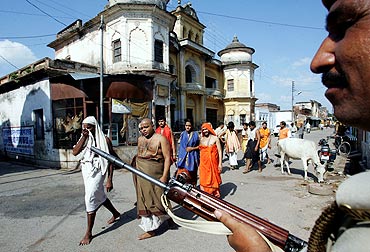
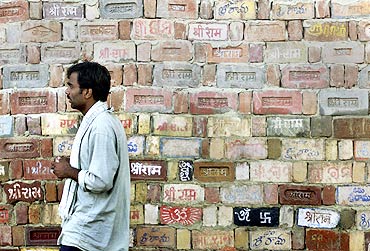
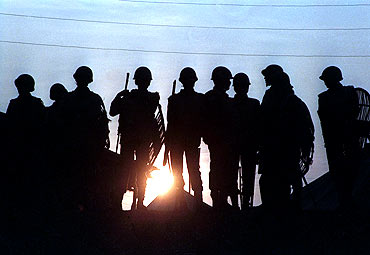
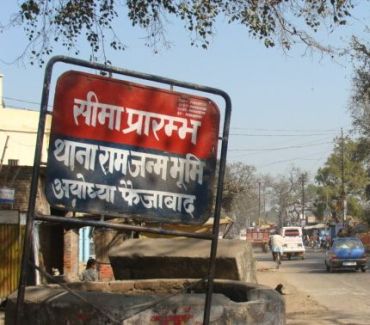
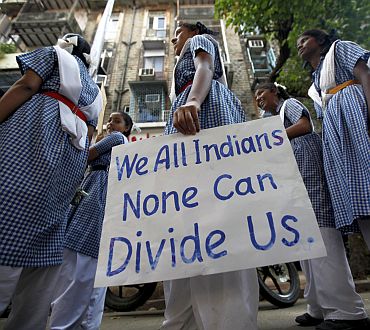
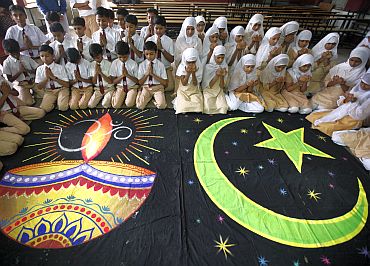
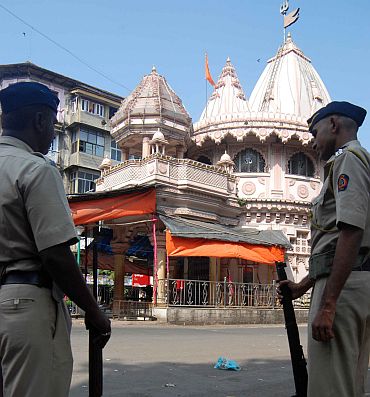
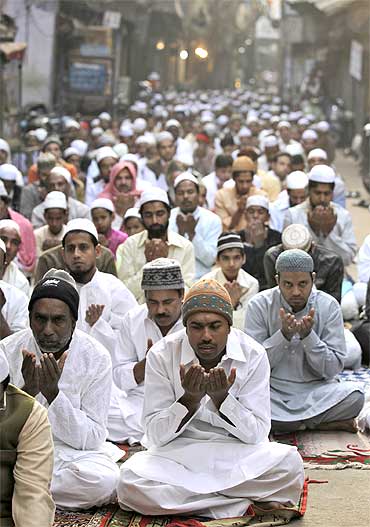
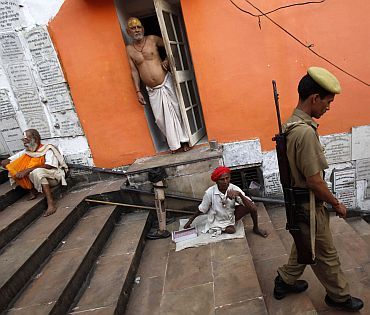

article